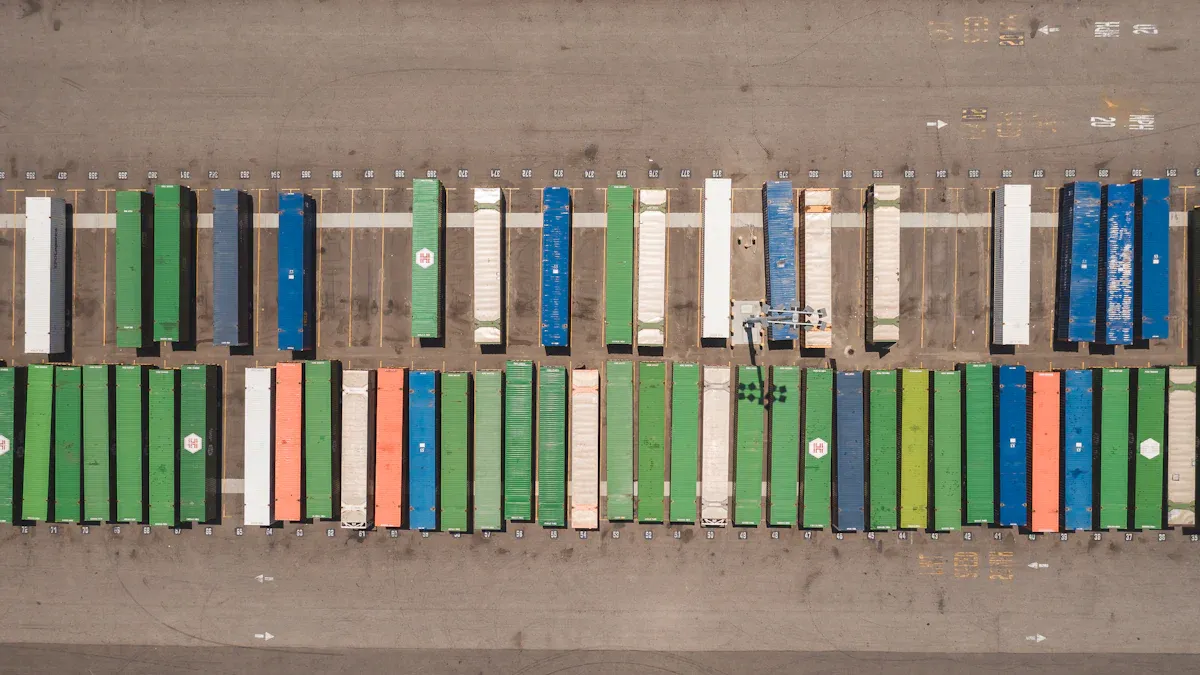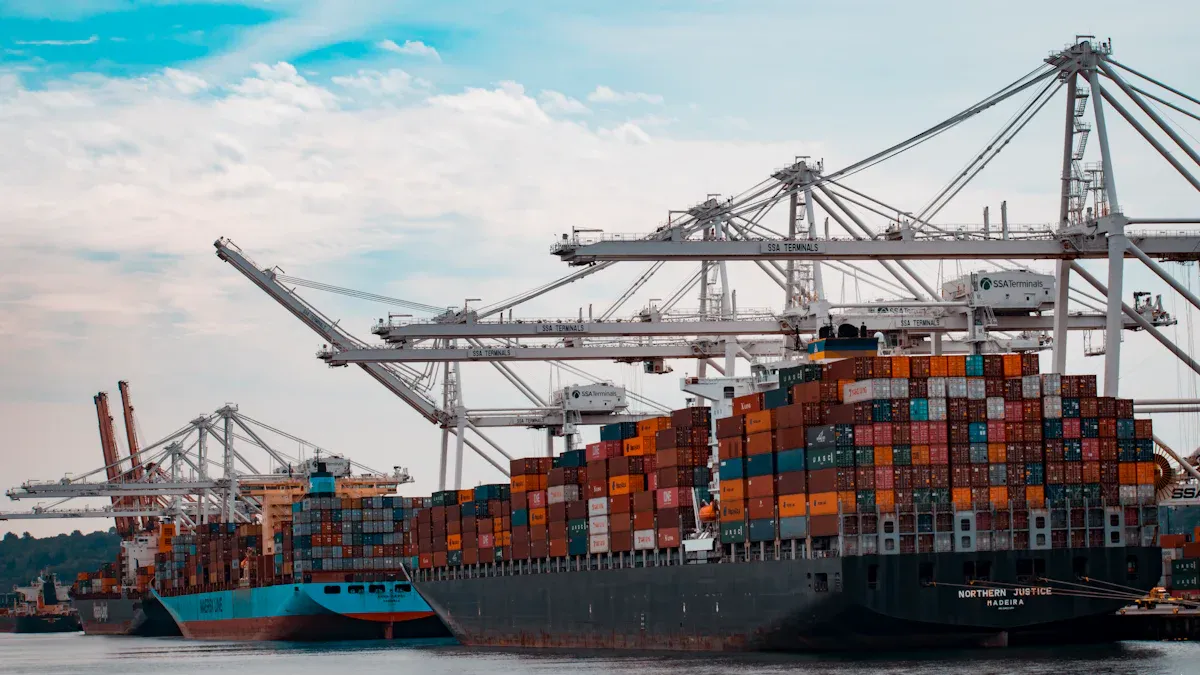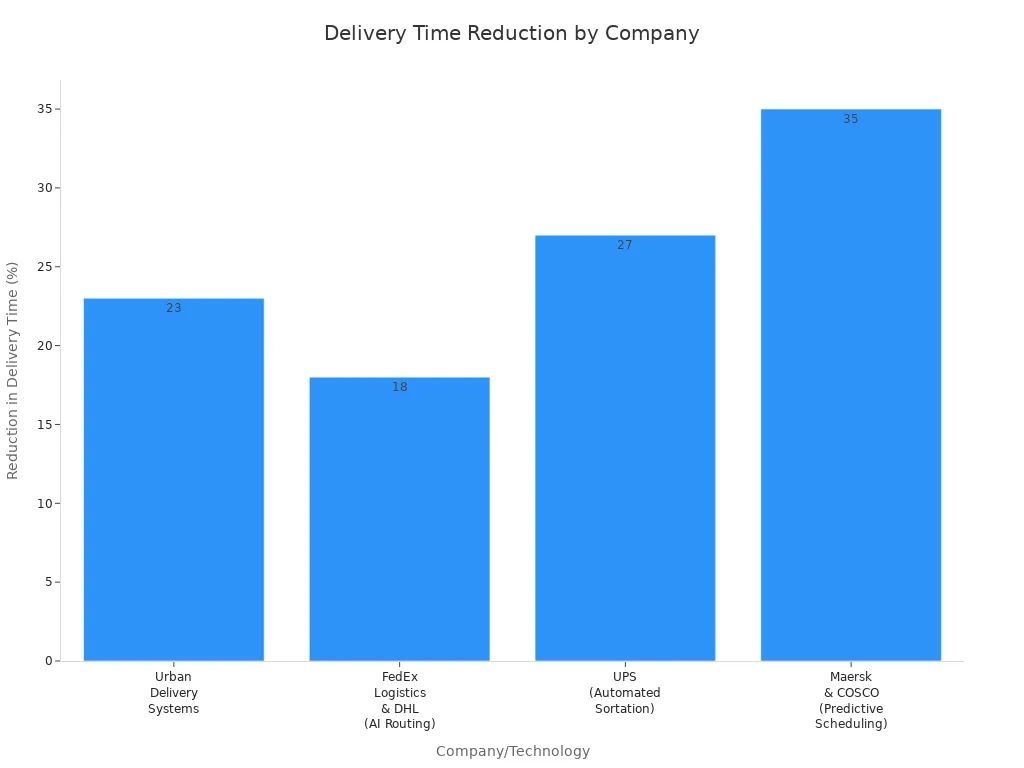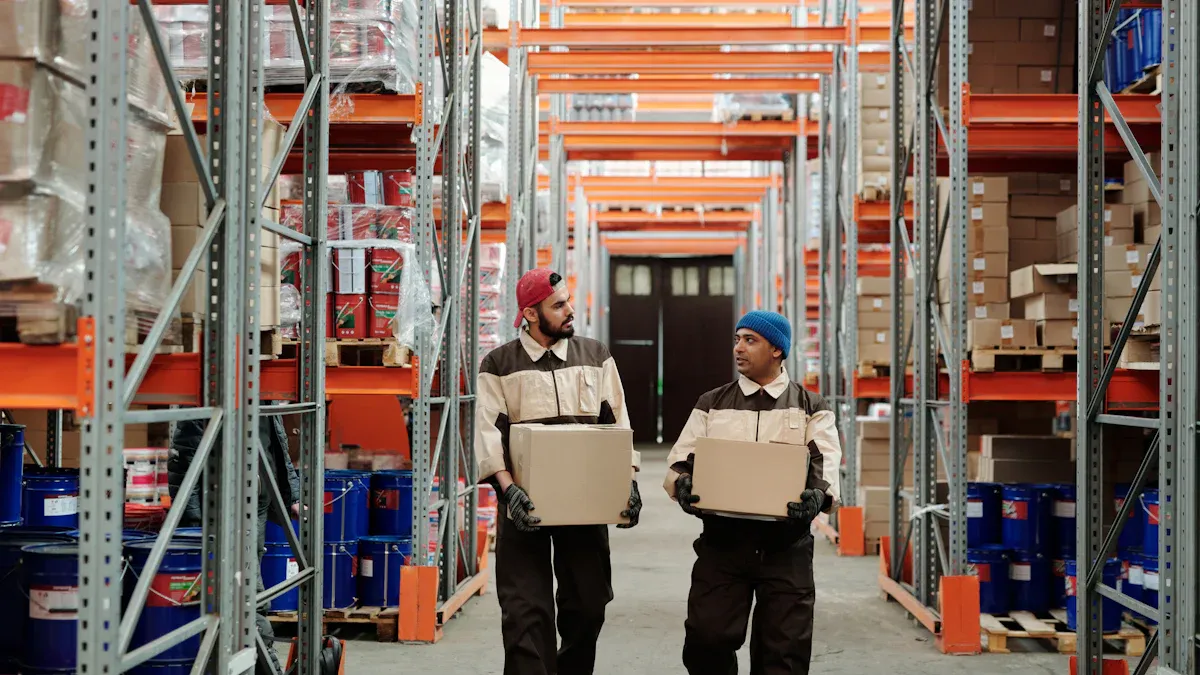What Are the Key Advantages of Global Business Logistics

You gain several global business logistics advantages when you optimize your supply chain.
You save costs by streamlining shipping and warehousing.
You reach new customers in different countries.
You improve delivery speed, which boosts customer satisfaction.
You meet higher consumer expectations for service quality.
These benefits help your business grow, compete, and operate more efficiently.
Key Takeaways
Optimize your supply chain to save costs and improve efficiency. Streamlined shipping and better packaging can significantly lower expenses.
Expand your market reach by utilizing global logistics. Access new customers in different countries and enhance your sales potential.
Adopt advanced technologies like AI and automation to boost operational efficiency. These tools help you manage inventory and predict shipping delays.
Improve customer satisfaction with faster delivery and better order tracking. Quick service builds trust and encourages repeat purchases.
Build a resilient supply chain to handle disruptions. Use predictive analytics and diversify suppliers to stay prepared for unexpected challenges.
Key Global Business Logistics Advantages

You can unlock several global business logistics advantages by focusing on three main areas: cost efficiency, market access, and operational efficiency. These areas help you save money, reach more customers, and improve how your business runs every day. Let’s look at each advantage and see how it works for your business.
Cost Efficiency
You can lower your costs by using smart global logistics strategies. When you work with different carriers, you get better shipping rates. This means you spend less on moving your products. You also save money by using better packaging. Good packaging protects your goods and lets you fit more items in each shipment. This reduces damage and shipping costs.
Many companies use automation and data tools to make better decisions. These tools help you plan routes, track shipments, and manage inventory. As a result, you use your resources wisely and avoid waste. For example, companies like UPS and DHL have changed their logistics models to save money and improve service. Here is a table showing how some companies achieved cost efficiency:
Company | Strategy Description | Cost Efficiency Achieved |
|---|---|---|
UPS | Adapted strategy to support healthcare logistics during the pandemic. | Significant turnover increase by shipping medical goods. |
XPO Logistics | Fostered long-term relationships and offered flexible staffing solutions. | Improved customer satisfaction and adaptability to demand. |
DHL | Outsourced logistics management to reduce overhead costs. | Cost-effective logistics model tailored to customer needs. |
KLM Cargo | Implemented sustainable transportation models to optimize air shipping costs. | Lowered carbon footprint while managing shipping costs. |
You can see that global business logistics advantages help you cut costs and stay competitive.
Market Access
You can reach new customers in different countries by using global logistics. This gives you a chance to grow your business and increase your sales. Strategic locations and strong transportation networks make it easier for you to enter new markets. You also get access to skilled workers and advanced business tools in global trade centers.
Here is a table that explains how global logistics helps you access new markets:
Evidence | Explanation |
|---|---|
Strategic geographical positioning | You can reach more customers and improve efficiency by choosing the right locations. |
Transportation infrastructure | Good logistics networks help you move goods quickly and reliably. |
Access to international talent pools | You can hire skilled workers and use advanced business systems in global hubs. |
Many companies that use global business logistics advantages see their market share grow.
Companies using logistics automation become more efficient and lower their costs.
Partnerships and new technology help you reach more customers.
E-commerce, manufacturing, and retail businesses often lead the way in using these solutions.
Operational Efficiency
You can make your business run smoother by adopting global logistics systems. These systems help you plan better, avoid delays, and keep customers happy. For example, companies use artificial intelligence to predict shipping delays, manage inventory, and track shipments in real time.
Here is a table showing how different companies improved their operations:
Company | Improvement Description | Operational Impact |
|---|---|---|
Maersk | Used predictive models to optimize vessel speeds and reduce fuel use. | Lower emissions and improved on-time reliability. |
Hapag-Lloyd | Implemented AI-driven load management for better container weight distribution. | Minimized idle time at ports. |
DHL Express | Integrated AI to predict customs delays and weather risks, reducing inquiries. | Enhanced customer communication and reduced frustration. |
FedEx | Deployed IoT-enabled AI to track parcel conditions in real time. | Proactive customer service interventions. |
Kuehne+Nagel | Utilized AI to anticipate vessel delays and rebook space on alternative carriers. | Decreased customer complaint rates. |
Port of Rotterdam | Deployed AI to optimize vessel scheduling, reducing waiting times. | Improved cargo reliability and faster ship turnaround. |
DP World Busan | Introduced AI-driven stacking system to minimize crane idle time. | Enhanced container retrieval speed. |
Lufthansa Technik | Applied AI for predictive maintenance, reducing unscheduled ground time. | Increased cargo punctuality and reliability. |
You can measure operational efficiency by looking at key metrics. These include transportation costs, on-time delivery rates, and warehouse expenses. When you improve these areas, you deliver better service and keep your customers coming back.
Tip: Focus on these global business logistics advantages to make your business stronger and more successful.
Enhanced Customer Service
You can make your customers happier by improving delivery speed and order tracking. These changes help you stand out and build trust with your buyers.
Faster Delivery
You want your products to reach customers quickly. Global logistics networks help you cut delivery times by using smart technology and better planning. Companies use automated sorting, AI routing, and predictive scheduling to move packages faster. Here is a table showing how much delivery times drop when businesses use these solutions:
Company/Technology | Reduction in Delivery Time |
|---|---|
Urban Delivery Systems | 23% |
FedEx Logistics & DHL (AI Routing) | 18% |
UPS (Automated Sortation) | 27% |
Maersk & COSCO (Predictive Scheduling) | 35% |

When you deliver faster, you meet customer expectations and encourage repeat purchases. You also reduce complaints and improve your brand reputation.
Tip: Fast delivery can turn first-time buyers into loyal customers.
Improved Order Tracking
You can give your customers peace of mind by letting them track their orders. Modern logistics systems use RFID scanners, smartphones, and tracking platforms to show real-time updates. These tools connect warehouses, transport providers, and customers. Here are some ways businesses improve order tracking:
RFID scanners and smartphones log packages instantly.
Warehouse management systems link inventory and shipping data.
Transport management systems organize shipments and keep communication open.
Tracking platforms let customers check order locations.
ERP systems connect all business processes for full traceability.
Advanced technology makes tracking even better. The table below shows how different tools help you and your customers:
Technology | Benefits |
|---|---|
Predicts delivery times and automates decisions. | |
Internet of Things (IoT) | Shows real-time supply chain status and solves problems quickly. |
Blockchain Technology | Keeps information secure and transparent. |
Autonomous Vehicles and Drones | Delivers packages faster and lowers costs. |
Advanced Robotics and Automation | Speeds up warehouse work and improves order accuracy. |
You can also improve customer service by using these strategies:
Strategy | Description |
|---|---|
Enhance Communication | Keep users informed at every stage of logistics with real-time updates on shipment status. |
Optimize Order Tracking | Invest in advanced tracking systems for accurate and up-to-date information on shipments. |
Provide Personalized Support | Offer tailored customer support to address individual needs and concerns effectively. |
Implement Supply Chain Visibility | Use tools that allow customers to track orders throughout the supply chain, enhancing transparency. |
Continuously Collect Customer Feedback | Regularly seek feedback to identify areas for improvement and enhance the overall customer experience. |
You gain global business logistics advantages when you focus on faster delivery and better order tracking. These improvements help you build strong relationships with your customers.
Inventory and Supply Chain Management

Inventory Optimization
You can make your business stronger by optimizing your inventory. When you connect logistics and inventory management, you streamline the flow of goods and cut costs. Real-time tracking gives you a clear view of your stock at every step. This helps you avoid running out of products or having too much sitting in storage.
Many companies use just-in-time (JIT) inventory systems. These systems let you stock goods based on what you need right now. You do not waste money on extra storage. Automated inventory replenishment uses predictive analytics to keep your shelves full without overstocking.
Here are some ways global logistics helps you optimize inventory:
Integrate logistics and inventory management to move goods efficiently.
Use real-time tracking for better visibility across your supply chain.
Adopt JIT systems to lower storage costs and respond quickly to demand.
Rely on automated replenishment to manage stock levels with data.
You can see the benefits of inventory optimization in the table below:
Benefit | Description |
|---|---|
Lowered costs | Small improvements in inventory can lead to big savings. |
Better profit margins | Good inventory management increases your profits. |
Greater business-wide visibility | Teams work better together when everyone sees the same data. |
Improved demand forecasting | AI and machine learning help you predict what customers want. |
More sophisticated outcomes | Analytics show you which products make the most money and where to store them. |
Scalability | Modern software lets you grow or change quickly when needed. |
Tip: Optimizing your inventory helps you save money and serve your customers better.
Supply Chain Resilience
You need a strong supply chain to handle surprises. Global logistics systems help you prepare for disruptions and keep your business running smoothly. Predictive analytics use real-time data to spot problems before they happen. Blockchain technology makes your transactions secure and easy to trace.
You can build resilience by using these strategies:
Use predictive analytics to anticipate and manage disruptions.
Apply blockchain for secure and transparent transactions.
Diversify your suppliers so you do not depend on just one source.
Embrace digital tools to improve visibility and decision-making.
Update your risk plans often to stay ready for new challenges.
When disruptions occur, you can respond quickly by:
Using data analytics to manage risks early.
Setting up backup suppliers and transport options.
Tracking shipments in real time for fast action.
Protecting your digital systems with strong cybersecurity.
A resilient supply chain keeps your business flexible and ready for anything. You can adapt to changes, protect your reputation, and keep your customers satisfied.
Competitive Edge and Risk Mitigation
Competitive Advantage
You can gain a strong competitive advantage by using global business logistics. When you manage your logistics well, you stand out in the market. You deliver products faster, keep costs low, and meet customer needs better than others. Your business becomes more flexible and can respond quickly to changes.
Here is a table that shows the main priorities that help you stay ahead:
Competitive Priority | Description |
|---|---|
Cost | You lower your logistics costs and offer better prices. |
Quality | You provide high-quality service and products to keep customers happy. |
Delivery | You deliver on time, which makes customers trust you. |
Responsiveness | You react quickly to customer needs and market changes. |
Flexibility | You adapt to new demands and situations with ease. |
Innovation | You improve your logistics processes to stay ahead of the competition. |
Collaboration | You work closely with partners to boost efficiency. |
Efficiency | You streamline your operations to save time and reduce waste. |
Tip: Focus on these priorities to build a business that customers choose again and again.
Risk Management
You face many risks when you operate globally. Good logistics strategies help you manage these risks and keep your business safe. You can use technology and strong processes to protect your goods, your people, and your reputation.
Here are some common risk management practices in global logistics:
Risk Management Practice | Description |
|---|---|
Compliance Measures | You run regular audits and train your team to follow all rules. |
Cargo Security Strategies | You use GPS tracking and cameras to watch your cargo and stop theft. |
Fleet Risk Management | You keep your vehicles in good shape and train drivers to avoid accidents. |
Warehouse Safety Measures | You set safety rules and teach workers how to prevent injuries. |
Project Management Practices | You coordinate with all partners and track progress to handle risks early. |
You can lower your risks by following these steps. You keep your supply chain strong and your customers happy. When you plan ahead, you protect your business from surprises and keep growing with confidence.
You gain many benefits from global business logistics. You save money, reach new markets, and improve how your business runs. These advantages help you grow and stay ahead of your competition. To get started, you can:
Adopt advanced technologies
Enhance supply chain visibility
Integrate sustainability practices into all operations
Develop regional sourcing hubs
Are you ready to take your business to the next level with global logistics?
FAQ
What is global business logistics?
You manage the movement of goods, information, and resources across countries. Global business logistics helps you deliver products to customers worldwide and supports your business growth.
How does global logistics reduce costs?
You save money by using efficient shipping routes, smart packaging, and automation. These strategies help you lower transportation expenses and avoid waste.
Tip: Compare shipping options before choosing a provider. You can find better rates and improve your profit margins.
What technology improves global logistics?
You use tools like artificial intelligence, real-time tracking, and automation. These technologies help you plan shipments, monitor inventory, and solve problems quickly.
Why is supply chain resilience important?
You protect your business from delays and disruptions. A strong supply chain helps you respond to unexpected events and keeps your customers satisfied.
Benefit | How It Helps You |
|---|---|
Flexibility | You adapt to changes fast |
Reliability | You deliver on time |
Security | You keep goods safe |
See Also
Key Strategies for Effective Management of Global Logistics
The Role of Direct Logistics in Enhancing Global Efficiency
Transforming International Operations with Innovative Logistics Solutions
Understanding Premier Global Logistics' B2B Services on the East Coast
